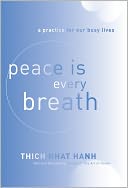Peace Is Every Breath

Full Title: Peace Is Every Breath: A Practice for Our Busy Lives
Author / Editor: Thich Nhat Hanh
Publisher: Harper Audio, 2011
Review © Metapsychology Vol. 15, No. 34
Reviewer: Shara Knight
American contemporary culture is fraught with a pace of life that invites psychological stress. A collective meltdown may be on the horizon without the ability to slow down and achieve a semblance of breathing room. While Western culture has become more familiar with the benefits of Eastern thought and practice, behavioral results remain to be seen in the collective culture of America. The pace of daily life for the average American has rapidly accelerated and continues to provoke health and well-being problems across the country. This audio book, read by voice talent instead of the author, is a two hour time-out for those who seek peace of mind in both the frenetic and the mundane aspects of everyday life.
One of the dilemmas of meditation-based practice is the actual application of the ideas and methods in everyday life. In response, Zen Master Thίch Nhãt Hanh wrote Peace in Every Breath, a book that makes the core teachings of Buddha accessible to Western sensibilities. In this contribution from the best-selling author, poet, peace activist, he does not propose that individuals escape from reality and put busy lives on hold. Instead, he provides the wisdom and processes to incorporate the practice of mindfulness into every waking moment. He shows how one can transcend the rush of daily life and discover an innate ability to experience inner peace and happiness. Nhãt Hanh coined the term engaged Buddhism and this audio book offers enlivened, practical steps to calm the body, mind, and spirit through being present in the moment regardless of the demands of a daily schedule. He offers personal anecdotes, meditations, and advice for mindfully connecting with one’s experience in the present moment. Nhãt Hanh (called Thây by his students) guides listeners around possible difficulties in journey toward awareness. Anecdotal examples of becoming more mindful include arising in the morning, grooming, preparing breakfast, and greeting the day and others. As in all of Buddhist teachings, the way to still the mind is through breath – “in-breath and out-breath” to shine the light of awareness on the mundane actions of everyday life. One meditation practice covered on this CD centers on the recognition of “habit energies,” their hold on the mind, and potential liberation from habit through the use of simple meditation. Gathas or short verses are dispersed throughout the recording to help the listener practice. Connection to the possibilities of joy and peace with every breath is highlighted with emphasis on mindfulness and its ability to heal suffering caused by stress.
What is the Zen concept of mind or duhnka? Duhnka has been translated as “suffering” but may be better translated as “dis-ease.” Additionally, the mysterious inner world of the psyche might offer a significant space where both analytical psychology and Buddhist thought can enter into dialogue on contemporary malaise, mind, and meditation. The Jungian individuation process may share some of the same processes found in the Zen meditation processes; the Buddhist intention seeking to transform the ego in order to help an individual overcome the “dis-ease” of life caused by impermanence. The embodied presence of the author’s own voice might have added a welcome nuance to the audio meditations; however voice talent Dan Warren is a fine stand-in to present the 84 year-old monk’s simple tenets for peace of mind. This audio book is another way of knowing, full of wise, practical advice, and especially relevant in the spirit of the times.
Thίch Nhãt Hanh studied at Princeton University, and later lectured at Cornell University and Columbia University with a focus to urge the U.S. government to withdraw from Vietnam. He urged Martin Luther King, Jr. to publically oppose the Vietnam War and King nominated Hanh for the Nobel Prize in 1967. In 1973, the Vietnamese government denied Nhãt Hanh permission to return to Vietnam and he went into exile in France. From 1976 to 1977, he led efforts to rescue Vietnamese boat people in the Gulf of Siam. Nhãt Hanh has become an important influence in the development of Western Buddhism and his teachings and practices seek to appeal to people from various religious, spiritual, and political backgrounds, intending to offer mindfulness practices for more Western sensibilities. He has published more than 100 books, including more than 40 in English. Monasteries in his tradition are located in France (Plum Village), Germany (European Institute of Applied Buddhism), New York (Blue Cliff Monastery), California (Deer Park Monastery), and Mississippi (Magnolia Grove Monastery). Nhãt Hanh currently lives in Plum Village, his meditation center in France (source: Thây’s Facebook page).
© 2011 Shara Knight
Shara Knight, Ph.D. Candidate, Depth Psychology, Concentration: Jungian and Archetypal Studies, Pacifica Graduate Institute
